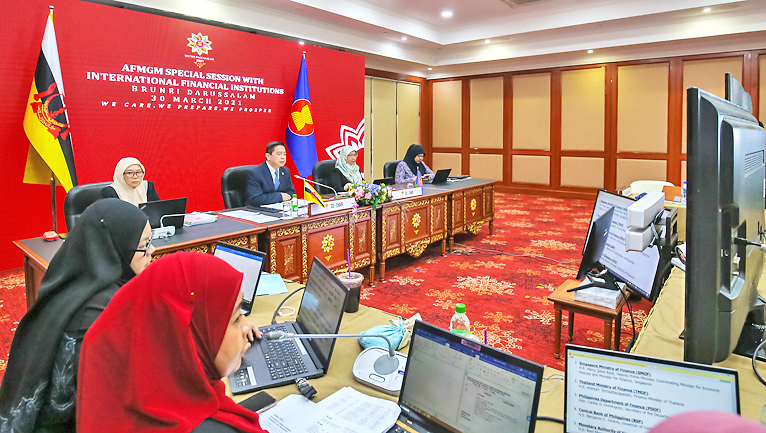Azlan Othman & Hakim Hayat
The 7th ASEAN Finance Ministers’ and Central Bank Governors’ Meeting (AFMGM) convened virtually on Tuesday.
Preceding this meeting were the ASEAN Finance Ministers’ and Central Bank Governors’ Meeting with Heads of International Financial Institutions (AFMGM-IFIs) and the 25th ASEAN Finance Ministers’ Meeting (AFMM).
The 25th AFMM was chaired by Minister at the Prime Minister’s Office and Minister of Finance and Economy II Dato Seri Setia Dr Awang Haji Mohd Amin Liew bin Abdullah, while the AFMGM and AFMGM-IFIs meetings were co-chaired by Dato Seri Setia Dr Awang Haji Mohd Amin Liew and Autoriti Monetari Brunei Darussalam (AMBD) Managing Director Hajah Rokiah binti Haji Badar.
Brunei Darussalam was represented by Deputy Minister of Finance and Economy (Fiscal) Dato Seri Paduka Awang Haji Ahmaddin bin Haji Abdul Rahman and AMBD Deputy Managing Director Hajah Noorafidah binti Haji Sulaiman.
Permanent Secretary (Performance and Corporate) at the Ministry of Finance and Economy Suraya binti Haji Jaidin also attended the meetings.

At the Special Session between ASEAN Finance Ministers and Central Bank Governors with Heads of International Financial Institutions, views were exchanged with the Asian Infrastructure Investment Bank (AIIB); Asian Development Bank (ADB); the International Monetary Fund (IMF); the World Bank and ASEAN+3 Macroeconomic Research Office (AMRO) on regional and global outlooks as well as efforts towards inclusive, digitally enabled and sustainable recovery.
Related to this, Dato Seri Setia Dr Awang Haji Mohd Amin Liew summarised the key points of discussions, highlighting the importance of technology and digital economy as a part of the ‘new normal’ and enablers for growth, quality investments that create more job opportunities and enhanced productivity, and ‘green’ growth strategies.
The 25th ASEAN Finance Ministers’ Meeting welcomed the progress of the various working groups under the purview of the ASEAN Finance Ministers’ Meeting. This includes issues pertaining to infrastructure financing; cooperation in insurance matters; ASEAN disaster risk financing and insurance; cooperation in customs; anti-money laundering and counter terrorist financing; ASEAN forum on taxation and ASEAN capital market forum. The meeting also noted the progress in the implementation of the Master Plan on ASEAN Connectivity (MPAC) and cooperation on sustainable infrastructure.
The 7th ASEAN Finance Ministers’ and Central Bank Governors’ Meeting discussed the progress and development of working groups under the Roadmap for Monetary and Financial Integration of ASEAN (RIA-Fin), whose overall progress has been encouraging. Brunei Darussalam’s three priority economic deliverables (PEDs) that fall under the ASEAN Finance Ministers and Central Bank Governors track were endorsed, namely the signing of the 9th ASEAN Framework on Services (AFAS) Protocol on Financial Services which will further liberalise financial services sector in ASEAN and therefore contribute to economic growth as well as progress ASEAN’s integration agenda; Convene ASEAN Financial Literacy Conferences to enhance financial literacy and financial inclusion which are key components in ensuring sustainable and resilient economic growth; and initiate the work on the establishment of the ASEAN taxonomy on sustainable finance.
The taxonomy will function as a tool to determine the eligibility of activities or investments to be classified as sustainable and provide more clarity to assist investors in identifying sustainable projects and prevent market fragmentation.
In continuing the AFMGM dialogue with the private sector, the meeting held a dialogue with the ASEAN Business Advisory Council, the EU-ASEAN Business Council and the US-ASEAN Business Council on issues relating to economic recovery efforts towards achieving sustainable, resilient and inclusive growth.